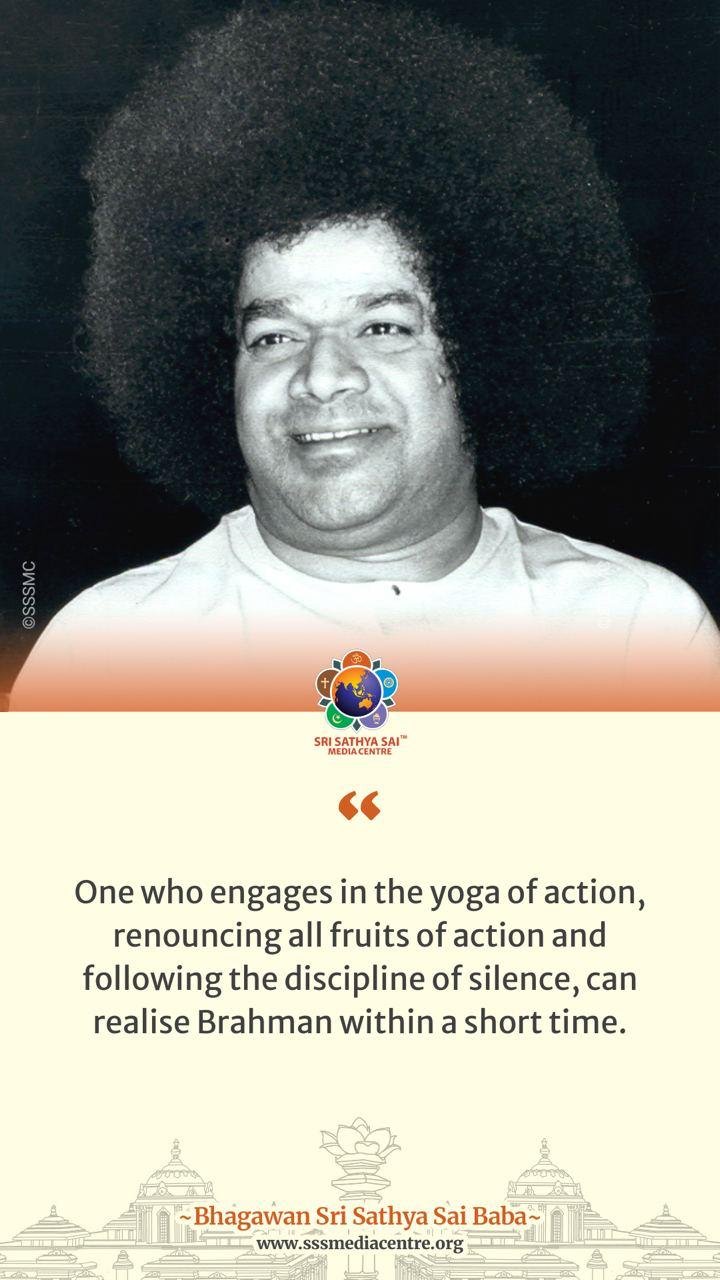අප විසින් තමන් සතු කාර්යයන්ගෙන් හා වගකීම් වලින් බැහැර නොවිය යුත්තේ ඇයිද යන්න භගවාන් සමිඳුන් විස්තර කරන්නේ එම කටයුතු වල නියැලීම සඳහා අපව නිසි මගට යොමු කරවමිනි.
අපගේ ක්රියාකාරකම් වල ඉලක්කය විය යුත්තේ ප්රඥාව සාක්ෂාත් කර ගැනීමයි. ප්රඥාව සාක්ෂාත් කර ගැනීම කළ හැක්කේ අපගේ ක්රියාකාරකම් තුළින් වේ. මේ සංකල්ප යුගලය තුළ පරාර්ථමය සේවාවන් කිරීම අනිවාර්යයෙන්ම අඩංගු වේ. පරාර්ථමය සේවාවන් කිරීම සඳහා ඔබගේ හදවත මමත්වයෙන් මිදුණු පවිත්ර තත්වයට පත් විය යුතුය. “මම මේ යහපත් කාර්යයන් කළා” යැයි පැවසීම හෝ තමන් කළ දේ තුළින් ප්රතිඵල අපේක්ෂා කිරීම සුදුසු නොවේ. මමත්වය හා ආශාව ක්රියාවන් වෙත බන්ධනය කරවයි. ආශාවන් පවිත්ර මනසට හා භක්ති ජනනයට බාධා කරවයි. තමන්ට අයත් කාර්යයන් මනාසේ ඉටු කිරීම මෙන්ම මමත්වය හා ආශාවන් බැහැර කිරීම දෙවියන් වෙත කෙරෙන සත්ය පූජාවයි. කර්ම යෝග අපට උගන්වන්නේ කර්ම නොහොත් ක්රියාවන් ක්රියා පමණක්ම විය යුතු බවයි. මෙවන් කර්ම තමන් තුළ විභව වන දිව්යත්වයේ ප්රතිබිම්බය හඳුනා ගැනීමට පාදක වේ.
– Divine Discourse, Nov 17, 1985.
යමෙක් ප්රතිඵල වලට ආශා නොවී, නිහඬව කර්ම යෝග තුළ නිමග්න වේද ඔහු කෙටි කලකදී බ්රහ්මන් අවබෝධ කර ගනී. ස්වාමි
Why is it important to not renounce activity or Karma completely? Bhagawan clearly guides us today so that we may march on with clarity.
The goal of karma (action) is Jnana (wisdom) and for Jnana, karma is the base. Combining the two in practice constitutes Seva (Selfless service). Through right conduct, the mind is purified and a pure mind leads to Atmic bliss. Hence, the duties that are enjoined on one have to be discharged. The foremost duty of man is to do good deeds with a pure heart. There should, however, be no egoistic feeling – “I have done these good deeds.” It is not right to entertain the slightest desire to enjoy the fruits of these actions. Egoism and desire are the cause of bondage to Karma. Desire is the barrier between the pure mind and devotion to the Self. To regard the performance of right action as one’s duty and to eschew egoism in one’s conduct, and desire in one’s motives is real sacrifice. Karma yoga teaches how actions should be performed. It enjoins duty for duty’s sake. Yogah Karmasu Kausalam (Yoga is excellence in action). It enables man to recognise the image of the Divine in him.
– Divine Discourse, Nov 17, 1985.
One who engages in the yoga of action, renouncing all fruits of action and following the discipline of silence, can realise Brahman within a short time. – BABA
நமது சிந்தனைக்கு பகவான் ஸ்ரீ சத்ய சாயி பாபாவின் அமுதமொழி – மார்ச் 26, 2024
கர்மாவின் பலன் ஞானம், ஞானமே கர்மாவிற்கு ஆதாரம். இரண்டின் இசைவை சாதிப்பதே சேவை. தார்மீகமான நடத்தையினால் சித்தசுத்தியும், சித்தசுத்தியினால் ஆத்மானந்தமும் கிட்டுகிறது. எனவே செய்ய வேண்டிய கர்மாக்களைச் செய்தே ஆக வேண்டும். நல்ல மனதுடன் நற்செயல்களைக் கடைப்பிடிப்பதே மனிதனின் பிரதான கடமையாகும். ஆனால், “இந்தப் பணி என்னால் தான் நிறைவேறியது,” என்ற அகந்தை நல்லதல்ல. இதன் பலன்களை நானே அனுபவிக்க வேண்டும் என்ற தீவிரப் பற்றும் எவ்விதத்திலும் சரியானதல்ல. இந்த அகந்தையும் தீவிரப் பற்றும், கர்மபந்தத்தை ஏற்படுத்த வல்லவை. சித்தசுத்திக்கும் ஆத்ம பக்திக்கும், தீவிரப் பற்று தடையாக இருக்கிறது. கர்மாவைச் செய்வது எனது கடமை என்ற பாவத்துடன், செயலாற்றுவதில் அகந்தை, அனுபவிப்பதில் தீவிரப் பற்று ஆகியவை இன்றி இருப்பதே தியாகமாகும். இதுவே கர்மயோகம். கர்மயோகம், கர்மாவை எவ்வாறு செய்ய வேண்டும் என்பதைப் போதிக்கிறது. கர்மாவுக்காகவே கர்மத்தைச் செய்ய வேண்டும் என்பதே கர்மயோகத்தின் சித்தாந்தமாகும். ‘யோகஹ கர்மசு கௌசலம்’ – அதாவது கர்மாவைத் திறம்படச் செய்யவேண்டும் என்பதையும், ஒவ்வொரு மனிதனும் ஆத்மாவின் ஒரு பிரதிபிம்பமே என்ற சத்தியத்தைச் சுட்டிக்காட்டுவதும் கர்மயோகம் ஆகும்.
– தெய்வீக அருளுரை, நவம்பர் 17, 1985


